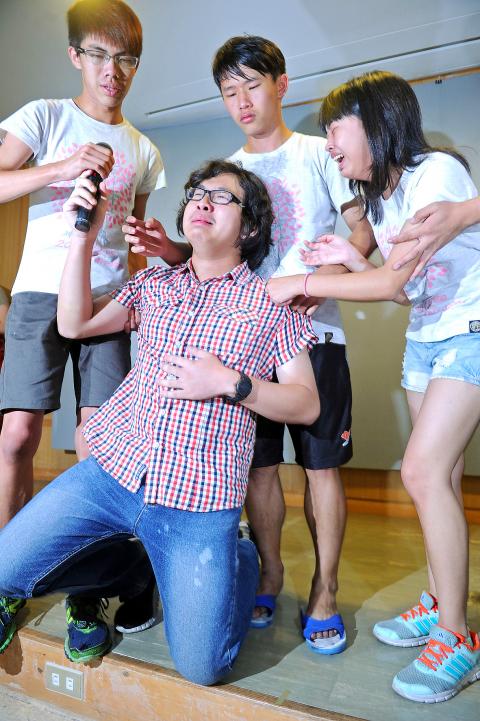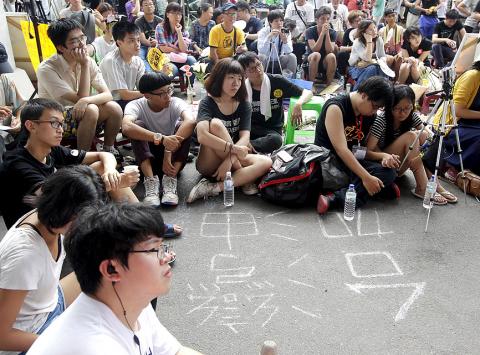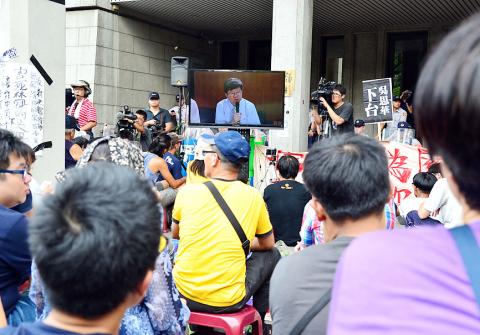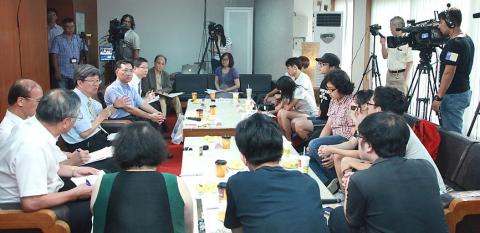Talks between Minister of Education Wu Se-hwa (吳思華) and students over the curriculum controversy fell apart yesterday, with students storming out of a Ministry of Education (MOE)-sponsored forum in tears.
“What in the world are these talks supposed to be?” Northern Taiwan Anti-Curriculum Changes Alliance convener Chu Chen (朱震) said. “What I see is a failure of education and a policy that has gradually moved away from the masses.”
“We are willing to accept a suspension of the implementation [of changes to curriculum guidelines] — all that is needed is those few words,” he said, repeatedly breaking into tears. “Only that would count as respect, without which, all we are left with, other than pain, is a hatred of the government and education.”

Photo: CNA
Wu repeated his position that it is administratively impossible for the guidelines to be withdrawn, because they have already gone into effect.
“I am truly willing to allow schools to make the decision about textbook choices. I think this is the solution to the problem,” Wu said when asked if the ministry could postpone implementation until next year.
The ministry’s policy of allowing schools to choose whether to use pre-adjustment textbooks represented the “maximum” it could do, he said, urging students to “return to school” and ask their teachers to keep using old textbooks if they disagree with guideline adjustments.

Photo: Reuters
After Wu’s rejection, Chu rushed from the meeting room in tears, shouting: “I am so sorry Dai Lin (林冠華),” referring to a student whose suicide on Thursday last week, allegedly in protest against changes to high-school curriculum guidelines, sparked the latest wave of student protests against the controversial adjustments, in which student protesters have occupied the ministry’s forecourt since Friday last week.
Chu was followed out the room by the few remaining student protesters, including Yi Juo-yu (伊若宇), who threw a badge at Wu, calling him “shameless” and promising to “look him up” later.
Prior to Chu’s outburst, most of the other students had already left the meeting in protest after Wu refused to make concessions, only to rush back and bang on the meeting door, saying that they needed to “save” Chu after he started to cry.

Photo: Wang Yi-sung, Taipei Times
In a tear-filled news conference afterward, students expressed their frustration with the ministry.
“Today is the day that Taiwan’s history and education died,” National Taichung First Senior High School Apple Tree Commune Club spokesperson Chen Chien-hsun (陳建勳) said. “All that the death of a student has gained is the education minister telling us that we should ‘look to the future.’ What is that supposed to mean?”
“Today we compromised and told the ministry that we could accept a ‘suspension’ or ‘freezing’ [of the implementation of curriculum guideline adjustments] because we are tired and we do not want anyone else to be hurt,” he said, falling to his knees as he apologized to protesters.

Photo: Liu Hsin-de, Taipei Times
Yesterday’s talks between Wu and student representatives at the National Central Library in Taipei focused on accusations of irregularities in the process under which the guidelines were adopted, with students citing the absence of academics of Taiwanese history from the review committee and the ministry’s loss in a lawsuit on procedural openness in calling for a suspension.
In response, Wu repeated previous ministry talking points, including that a Control Yuan investigation had found no problems with the procedures and that the ministry had a responsibility to protect the privacy of academics who participated in the guideline’s review committee.
Wu arrived 10 minutes late for the forum, and at one point rolled his eyes in response to comments made by National Taiwan University history professor Hua Yih-fen (花亦芬), who accompanied the students.
She told him that there would be no way to “help” him if he kept using “bureaucratic verbal tricks” and “administrative procedures” to respond to the students.
Deputy Minister of Education Lin Teng-chiao (林騰蛟) after the forum finished announced four concessionary displays of “good will” to the students, including a promise to reveal the names of members of the guideline review committee members within 10 days of asking their permission, adding an appendix on controversial terminology to the outlines, guaranteeing schools the right to select their own textbooks and initiating a “rolling review” of the review process.
He said the event was a “good start” for communication between the ministry and students, adding that the ministry was open to arranging further meetings.
Although the ministry had previously suspended implementation of the original 2009 curriculum guidelines, the current round of adjustments could not be suspended, because it had already been implemented, he said, adding that suspension would put the ministry on the line to cover the losses of publishers that have already revised textbooks.
The ministry would investigate the possibility of covering the losses of schools that wish to switch back to old textbooks, he said. Most schools had already completed the textbook selection process when the ministry announced in June that schools were free to continue using the old versions of textbooks.
At press time last night, a large crowd remained in the ministry’s courtyard, with student representatives saying that they would announce their next steps today.

INVESTIGATION: The case is the latest instance of a DPP figure being implicated in an espionage network accused of allegedly leaking information to Chinese intelligence Democratic Progressive Party (DPP) member Ho Jen-chieh (何仁傑) was detained and held incommunicado yesterday on suspicion of spying for China during his tenure as assistant to then-minister of foreign affairs Joseph Wu (吳釗燮). The Taipei District Prosecutors’ Office said Ho was implicated during its investigation into alleged spying activities by former Presidential Office consultant Wu Shang-yu (吳尚雨). Prosecutors said there is reason to believe Ho breached the National Security Act (國家安全法) by leaking classified Ministry of Foreign Affairs information to Chinese intelligence. Following interrogation, prosecutors petitioned the Taipei District Court to detain Ho, citing concerns over potential collusion or tampering of evidence. The

‘FORM OF PROTEST’: The German Institute Taipei said it was ‘shocked’ to see Nazi symbolism used in connection with political aims as it condemned the incident Sung Chien-liang (宋建樑), who led efforts to recall Democratic Progressive Party (DPP) Legislator Lee Kun-cheng (李坤城), was released on bail of NT$80,000 yesterday amid an outcry over a Nazi armband he wore to questioning the night before. Sung arrived at the New Taipei City District Prosecutors’ Office for questioning in a recall petition forgery case on Tuesday night wearing a red armband bearing a swastika, carrying a copy of Adolf Hitler’s Mein Kampf and giving a Nazi salute. Sung left the building at 1:15am without the armband and apparently covering the book with a coat. This is a serious international scandal and Chinese

Seventy percent of middle and elementary schools now conduct English classes entirely in English, the Ministry of Education said, as it encourages schools nationwide to adopt this practice Minister of Education (MOE) Cheng Ying-yao (鄭英耀) is scheduled to present a report on the government’s bilingual education policy to the Legislative Yuan’s Education and Culture Committee today. The report would outline strategies aimed at expanding access to education, reducing regional disparities and improving talent cultivation. Implementation of bilingual education policies has varied across local governments, occasionally drawing public criticism. For example, some schools have required teachers of non-English subjects to pass English proficiency

TRADE: The premier pledged safeguards on ‘Made in Taiwan’ labeling, anti-dumping measures and stricter export controls to strengthen its position in trade talks Products labeled “made in Taiwan” must be genuinely made in Taiwan, Premier Cho Jung-tai (卓榮泰) said yesterday, vowing to enforce strict safeguards against “origin laundering” and initiate anti-dumping investigations to prevent China dumping its products in Taiwan. Cho made the remarks in a discussion session with representatives from industries in Kaohsiung. In response to the US government’s recent announcement of “reciprocal” tariffs on its trading partners, President William Lai (賴清德) and Cho last week began a series of consultations with industry leaders nationwide to gather feedback and address concerns. Taiwanese and US officials held a videoconference on Friday evening to discuss the